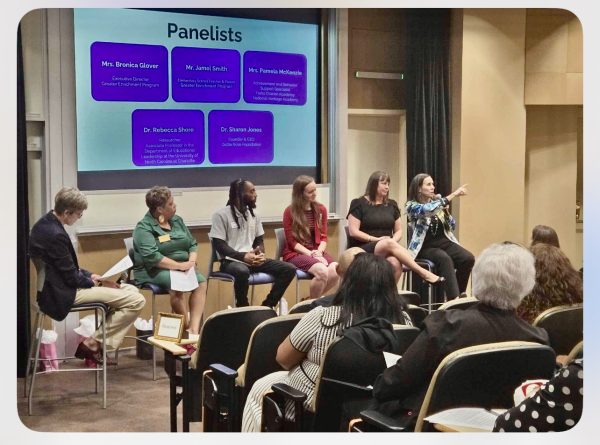Dr. Rebecca Shore and Mental Health Awareness

Dr. Rebecca Shore, Associate Professor, in the Department of Educational Leadership was an invited guest panelist for National Mental Health Month in May. The discussion focused on “Raising Resilience in NC Schools: A Youth Mental Health Summit” at Queens University in Charlotte, NC. She shared research on Mindfulness training and interventions in schools. The panel was supported by Inner Explorer, Wellbeing Action for Youth (WAY), GreenLight Fund, and the NCDPI.
Dr. Shore explained, that in a nutshell, mental health is another offshoot of overall brain health, as is any state (academic success or failure, happiness or sadness, it’s all brain chemistry). So learning how to create ideal environments and habits that lead to improved brain health should also lead to improved mental health.
Why is mental health an important topic in education today?
Poor mental health is linked to poor academic performance so it’s imperative we understand and work to bolster youth mental health so they can succeed in school and have more opportunities in life.
According to the recently released · Annie E Casey- Kids Count report, academic performance declined, with nearly 75% of fourth and eighth graders not proficient in basic skills. More young people are disconnected with 1.2 million teens not in school or working in 2023. Child and teen deaths increased 16% from 2019 to 2023.
Most experts now think that chronic stress is a major contributor leading to these catastrophic stats above. In fact, a statement from the Governor’s Roundtable on Youth Mental Health noted: “Evidence shows that prevention and resilience building in childhood and adolescence can fundamentally change the trajectory of a child and family’s life. Given supportive environments and the right skillset, the effects of adverse childhood experiences (ACEs) and exposure to toxic stress can be successfully managed to prevent mental health challenges from developing or worsening. Strengthening youth mental health, starting with prevention and a focus on stress resilience, needs to be a key priority within all levels of government, and across all sectors of society.”
What were the key takeaways you hoped to share with attendees?
That we can implement stress resilience in all schools in Charlotte and throughout NC right now. There is evidence that mindfulness programs (Inner Explorer and others) reduce stress, improve resilience, bolster emotional regulation and improve grades and test scores. I consider this a part of Instructional Leadership. I teach most of the Instructional Leadership courses in the Master’s in School Administration and EDD programs in our department and I emphasis brain development and brain health in all of them. It is easy to implement (only takes a few minutes of class time), inexpensive and in fact supports educator and staff well-being at the same time!
In the current environment with so much stress, chaos and elevated anger, a program that can improve regulation and impulse control could help our communities navigate this time with greater discernment and clarity and produce positive outcomes for children and adults.
Dr. Shore concluded, after 45 years of working in K-12 education and researching every effort that I have read about, heard about, or tried myself, practicing a bit of mindfulness in the classroom has had the most concrete, measurable positive outcomes for students and teachers of any reform effort that I have seen. I am thrilled to have become part of this effort.
News feature developed by: Bless Dupeh, Graduate Assistant